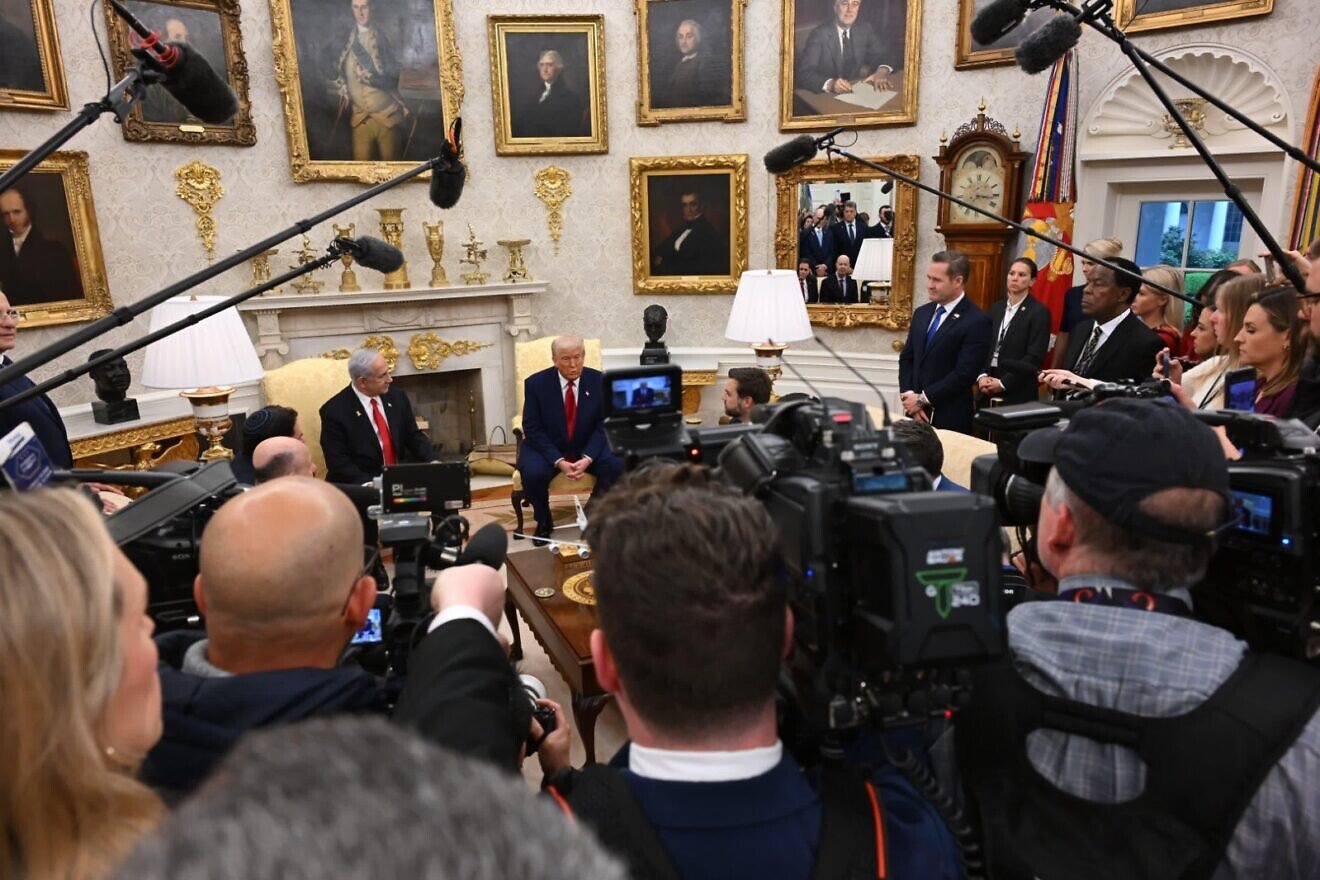
 Trzydzieści lat temu Izrael deportował przywódców Hamasu. Świat zmusił Izrael do przyjęcia ich z powrotem
Trzydzieści lat temu Izrael deportował przywódców Hamasu. Świat zmusił Izrael do przyjęcia ich z powrotem
Daniel Greenfield
Tłumaczenie: Małgorzata Koraszewska
„Deportować nadzieję na pokój?” – zdumiewał się ”Newsweek”. Ich nadzieją na pokój był Hamas.
Był rok 1992. Administracja Clintona próbowała nakłonić premiera Izraela Icchaka Rabina do podpisania porozumienia o procesie pokojowym w celu utworzenia państwa „palestyńskiego”, ale terroryści z Hamasu nie przestali zabijać Izraelczyków.
15-letnia Helena Rapp została śmiertelnie dźgnięta nożem na przystanku autobusowym w drodze do szkoły. Kilka dni później islamski terrorysta zamordował rabina Szimona Birana, ojca czwórki dzieci.
Zirytowany ostatnimi zabójstwami premier Rabin wsadził 417 islamistycznych terrorystów, w tym czołowych przywódców Hamasu, do autobusów i wyrzucił ich po libańskiej stronie granicy.
Autobusów było sześć i byli w nich przywódca Hamasu Ismael Hanija, współzałożyciel Hamasu Abdel Aziz al-Rantisi, który miał ślubować, „na Allaha, nie zostawimy ani jednego Żyda w Palestynie”, Abu Osama, który pomógł opracować kartę Hamasu wzywającą do eksterminacji Żydów, współzałożyciele Hamasu Mohammed Taha, Hammad Al-Hasanat i Mahmoud Zahar, którzy głosił „Zalegalizowali zabijanie ich ludzi na całym świecie przez zabijanie naszych ludzi”, Hamad Al-Bitawi, który twierdził, że „dżihad jest zbiorowym obowiązkiem” wraz z Abdullahem al-Szamim, przywódcą Islamskiego Dżihadu, i wieloma innymi obecnymi i przeszłymi islamskimi przywódcami terrorystycznymi deportowanymi do Libanu.
„New York Times” zatytułował swoje relacje Ousted Arabs Shiver and Wait in Lebanese Limbo [Wypędzeni Arabowie drżą i czekają w libańskim limbo]. „Newsweek” również ze współczuciem opisał, jak terroryści z Hamasu „drżeli z zimna”. „Washington Post” starannie opisywał „ślady na skórze” po kajdankach. Associated Press szczegółowo relacjonowała przypadki biegunki, która zamieniła wypróżnienia islamskich terrorystów w temat godny międzynarodowego nagłośnienia.
W rzeczywistości terroryści z Hamasu i Islamskiego Dżihadu zostali wyposażeni przez Izrael w płaszcze, koce, jedzenie i po 50 dolarów na osobę: więcej niż wystarczająco, aby kupić wszystko, czego potrzebowali w Libanie.
„Jesteśmy spragnieni, zmarznięci i głodni” — powiedział dr Abdul-Aziz Rantisi — tak „Times” rozpoczął swój artykuł. Wspomniał, że Rantisi planuje strajk głodowy, a nie, że jest przywódcą terrorystów.
„Los Angeles Times” pisał, że naruszono „wolność słowa” terrorystów. Pytali ich o „określenie warunków członkostwa w Hamasie” i poinformowali, że „wielu z nich odpowiedziało: ‘Modlić się i być dobrymi muzułmanami’”.
W ten sposób media przedstawiły Amerykanom islamską organizację terrorystyczną.
Czerwony Krzyż, który po 7 października 2023 r. nie odwiedził izraelskich zakładników, w tym dzieci i starszych kobiet przetrzymywanych przez Hamas, szybko pojawił się na miejscu z „trzema ciężarówkami namiotów, żywności, koców i pościeli”. Organizacja pomocowa rozstawiła namioty dla terrorystów z Hamasu, którzy najwyraźniej byli zbyt leniwi lub niekompetentni, żeby rozstawić własne namioty.
Szef UNRWA wyruszył z Wiednia, aby odwiedzić wypędzonych terrorystów z Hamasu.
Bernard Pfefferle, lokalny główny delegat Międzynarodowego Komitetu Czerwonego Krzyża, szlochał: „Oni nie przetrwają zimy w ten sposób”.
W rzeczywistości przetrwali całkiem nieźle.
Podsekretarz generalny ONZ James OC Jonah, Bernard Kouchner, francuski minister ds. humanitarnych i wielu innych zagranicznych dygnitarzy odwiedziło terrorystów z Hamasu.
Ambasador Francji Daniel Husson poprosił o spotkanie z terrorystami z Hamasu, by „wyrazić współczucie Francji dla ich sprawy”.
Amnesty International zorganizowała kampanię pisania listów, w której narzekano, że deportowani z Hamasu „żyją w namiotach w mroźnych warunkach” i domagano się „bezpiecznego powrotu deportowanych do Izraela”. B’Tselem, proterrorystyczna grupa „praw człowieka” działająca w Izraelu, potępiła deportacje jako „rażące naruszenie praw człowieka”. Podczas ataków 7 października Vivian Silver, członkini zarządu B’Tselem, została zabita przez terrorystów, obronie których poświęciła całe swoje życie.
B’Tselem była jedną z proterrorystycznych grup, które pierwotnie zaskarżyły deportacje do Sądu Najwyższego Izraela, próbując zatrzymać Hamas w Izraelu.
Media nieustannie relacjonowały o sprawie deportowanych z Hamasu w sposób, w jaki nie relacjonowały o ich ofiarach. W sumie Abdel Aziz al-Rantisi zorganizował rekordowe 1500 konferencji prasowych. Za każdym razem, gdy islamscy terroryści kichnęli, był tam korespondent, który o tym pisał, fotograf, który robił zdjęcia i aktywista praw człowieka, który potępiał Izrael.
Nawet jeśli wszystko, co mówili, było kłamstwem.
„WYDALONYM PALESTYŃCZYKOM BRAKUJE WODY”, krzyczał nagłówek w „Washington Post”. W tym samym artykule gazeta wspomniała, że czerpią wodę ze strumienia. Autorzy innych artykułów narzekali, że kończy im się woda, podczas gdy byli otoczeni śniegiem.
W jednym z artykułów Associated Press opisano deportowanego, który jadł śniadanie składające się z dżemu, sera i chleba lub fasoli i ciecierzycy z sosem cytrynowym, a następnie lunch składający się z tuńczyka lub sardynek, po czym narzekał: „Mam już dość tego jedzenia. Jem tylko po to, żeby przeżyć”.
W rzeczywistości Hamas i islamscy terroryści mieli mnóstwo jedzenia i wody. W pewnym momencie nawet artykuł w „New York Times” przyznał, że „w czwartek Palestyńczycy powiedzieli, że pościli w ciągu dnia, aby zachować zapasy żywności, które skurczyły się do makaronu i ziemniaków, a woda pitna całkowicie zniknęła. Jednak dzisiaj reporter Associated Press powiedział, że deportowani mężczyźni gotowali ryż, ciecierzycę i konserwy mięsne, a niektórzy jedli jajka”.
Tydzień po deportacji „New York Times” twierdził, że terroryści z Hamasu za kilka dni zaczną „umierać na zapalenie płuc”. Żaden z nich jakoś nie umarł nawet po siedmiu miesiącach.
W rzeczywistości organizowali wystawne uczty religijne z terrorystami z Hezbollahu i irańskiego IRGC. Miasteczko namiotowe stało się enklawą pełną telewizorów, faksów, kserokopiarek, telefonów komórkowych, lodówek wypełnionych napojami gazowanymi i z anteną satelitarną, z pomocą której odbierane były irańskie programy telewizyjne.
Izrael wydalił terrorystów z Hamasu do Libanu, ale libański rząd sprzymierzony z Hezbollahem odmówił ich przyjęcia i zablokował drogę czołgami, aby uniemożliwić im wyjazd. Libański nie pozwalał na wjazd terrorystów z Hamasu, ale pozwalał reporterom i ekipom filmowym udokumentować „drżenie z zimna” przywódców Hamasu.
W obliczu zapowiedzi egipskiej polityki blokady Gazy, Liban uniemożliwił terrorystom z Hamasu wjazd do Libanu. A społeczność międzynarodowa i media zrzuciły winę na Izrael, a nie na Liban, który uniemożliwiał im wjazd na swoje terytorium.
Rada Bezpieczeństwa ONZ jednogłośnie przyjęła rezolucję nr 799 potępiającą deportacje terrorystów z Hamasu i domagającą się, aby Izrael „zapewnił bezpieczny i natychmiastowy powrót na okupowane terytoria wszystkim deportowanym”.
Pierwsza administracja Busha zagłosowała za rezolucją, mimo że wzruszyła ramionami, gdy rok wcześniej Kuwejtczycy wydalili 200 tysięcy „Palestyńczyków” przy użyciu czołgów i wojska.
„Myślę, że oczekujemy trochę za dużo, jeśli prosimy ludzi w Kuwejcie, aby przyjęli życzliwie tych, którzy szpiegowali ich rodaków, którzy brutalnie traktowali tam rodziny i tym podobne rzeczy” — powiedział wówczas prezydent George HW Bush.
Izraelczycy mieli jednak życzliwie traktować terrorystów z Hamasu, którzy ich masakrowali. Administracja Busha „stanowczo potępiła” deportacje. Bill Clinton nie był lepszy.
„Podzielam gniew, frustrację i oburzenie narodu izraelskiego. I rozumiem, co czują. Muszą bardzo stanowczo rozprawić się z tą grupą Hamas, która najwyraźniej jest nastawiona na wszelkiego rodzaju działania terrorystyczne” — powiedział Clinton, który wkrótce miał objąć urząd. Dodając jednak: „Z drugiej strony obawiam się, że ta deportacja może pójść za daleko i zagrozić rozmowom pokojowym”.
„Nie jesteśmy pewni, czy prezydent-elekt Clinton i jego zespół w pełni rozumieją niebezpieczeństwo ze strony fundamentalizmu islamskiego” – powiedział premier Rabin przed spotkaniem z Billem Clintonem.
Premier Rabin deportował terrorystów z Hamasu i Islamskiego Dżihadu tylko tymczasowo na dwa lata, aby poprawić swój wizerunek w kraju i zyskać trochę czasu na spokojne negocjacje pokojowe. Jego koalicja partii lewicowych i skrajnie lewicowych wkrótce rozpadła się, a część poparła bardziej lewicową koalicję przyszłego premiera Szimona Peresa. „Nikt nie cieszy się z cierpienia tych ludzi – powiedział Peres. – Izrael ich deportował, ale nie miał zamiaru ich skrzywdzić”. Lewicowa koalicja partii Meretz nazwała deportację Hamasu „rażącym naruszeniem praw człowieka”.
Pod presją administracji Clintona, która ostrzegała, że nie ochroni Izraela przed sankcjami ONZ, oraz członków jego własnej lewicowej koalicji, Rabin zaproponował powrót terrorystów z Hamasu, jeśli obiecają, że „zaprzestaną terroru i przemocy na czas negocjacji pokojowych”. Terroryści odmówili złożenia takiej obietnicy. Mimo to Rabin zgodził się przyjąć ponad setkę z nich natychmiast, a resztę po roku. Hamas zaczął powracać do Izraela w 1993 roku.
Terroryści z Hamasu zgodzili się na powrót tylko dlatego, że telewizja nie relacjonowała już wystarczająco często ich wyczynów.
„Wśród powodów podanych przez deportowanych Palestyńczyków, dla których zaakceptowali oni działania Izraela mające na celu umożliwienie połowie z nich powrotu na Zachodni Brzeg i do Strefy Gazy, znalazł się nie brak pożywienia i schronienia, ale brak relacji ze strony mediów informacyjnych, w tym telewizji” – donosił „New York Times”.
30 lat temu Izrael wydalił przywódców Hamasu i Islamskiego Dżihadu, a następnie przyjął ich z powrotem.
Dwa tygodnie po tym, jak Rabin zgodził się przyjąć z powrotem terrorystów z Hamasu, Grupa Islamska, która, podobnie jak Hamas, wyłoniła się z Bractwa Muzułmańskiego dokonała zamachu bombowego na World Trade Center.
„Nasza walka z morderczym islamskim terrorem ma również na celu obudzenie uśpionego świata. Wzywamy wszystkie narody i wszystkich ludzi, aby poświęcili uwagę prawdziwemu i poważnemu niebezpieczeństwu, które zagraża pokojowi świata w nadchodzących latach. Niebezpieczeństwo śmierci jest u naszego progu”, ostrzegał wówczas premier Rabin. Ale świat nadal spał. Spał również Izrael.
Zawartość publikowanych artykułów i materiałów nie reprezentuje poglądów ani opinii Reunion’68,
ani też webmastera Blogu Reunion’68, chyba ze jest to wyraźnie zaznaczone.
Twoje uwagi, linki, własne artykuły lub wiadomości prześlij na adres:
webmaster@reunion68.com





